- Home
- Catherine Spencer
Dominic's Child Page 11
Dominic's Child Read online
Page 11
A short time later, when she pressed herself to him, reveling in the close tangling of his limbs with hers and the proud thrust of his erection at the juncture of her thighs, he muttered, “I want you so badly, Sophie, I’m afraid. What if I hurt you or the baby?”
And she felt cherished, treasured.
“You won’t,” she whispered, opening herself to him. “Hurry, Dominic, please. I need you. Let me feel you inside me.”
Loving him with her eyes, her hands, her soul, she wrapped her legs around his waist, tilted up her hips and captured him. She saw the sweat break out on his forehead, felt his tension as he fought to exercise restraint. And felt whole for the first time in months when he lost the battle and buried himself deep within her.
She had known desire before. At least, she thought she had. But it was only then, in Dominic’s arms, with the fires of passion raging between them and creating such turmoil in her blood, that she realized she’d known nothing.
Less than nothing. Because this was passion that went beyond mortal cognizance to approach the sublime. He could take whatever he wanted of her and she would give until she had nothing left to give. And then she would give some more.
“Wow!” he breathed when the clenching shudders subsided. Lifting his head, he grinned at her, a marvelous shining joy curving his mouth. “Would you like to do that again some time?”
Simple truth. “Yes,” she said. “Often.”
“Here?” The smile crept past the thick sweep of his lashes to his eyes. “I can light the fire to make it more romantic.”
“I’d miss you,” she said.
“You wouldn’t have time. All I need to do is reach up and press the switch that turns on the gas.” He lifted himself and leaned on one elbow. “Or we could behave like the decorously married couple we’ll soon be and retire to the bedroom.”
“Yours?” she inquired pertly, raking a fingernail through the dusting of dark hair on his chest. “Or mine?”
He sobered and cupped her face in his palm. “How about ours?”
He told her he loved her all night long, if not with words then in the ardor with which he possessed her more than once as the hours slid by, and in the way he held her during the times in between.
When she awoke, he was beside her still, pushing the hair away from her face and kissing her. He promised her breakfast in bed but made love to her instead. And she couldn’t keep the feelings to herself. She had to try to seal them with words.
“I wish it could always be like this, Dominic,” she breathed, rippling around him as ecstasy took hold.
“Just keep this moment,” he panted, fighting to stave off completion. “Hold it to you and remember it tomorrow, next year—whenever you feel unsure.”
She held him close and rode with him, too consumed with the fire to say what she really wanted to say, which was that she had loved him for a long time and would do so for the rest of her life.
There would be time enough for that. There might even be a time when he would say the same thing to her.
“I’m not going into the office today,” he told her after breakfast. “I’ve got a load of paperwork to wade through but I can do it here. That way I’m handy if you need help with any of those boxes.”
“It’s mostly clothes,” she said, suddenly unsure of herself again. Did he expect her to share his room now, or would that be an occasional thing only? Deeming it wiser not to push too hard, too soon, she continued, “I guess I’ll get started hanging them in the guest room.”
He combed his fingers through his hair and laughed. “That’s probably best. My closet’s a mess. You’ll have to take me in hand and cure me of my bachelor ways when we move into the house.”
For the first time, she dared to believe they could break free of the past. The future shone full of bright optimism, with no premonition of disaster to darken it.
Humming to herself, she lifted lingerie from her open suitcase and folded it neatly in the paper-lined drawers of the triple dresser running along one wall of the guest room. The ringing of the doorbell didn’t rouse her to alarm; it didn’t even interrupt her singing. There was nothing in the world that could spoil her happiness.
She was marginally conscious of Dominic crossing the marble-tiled foyer to the front door and of the nanosecond of silence that followed. And still that famed intuition with which all women were supposedly blessed failed to alert her. She was blithely, utterly caught up in her fantasy of happily-ever-after, which perhaps accounted for her taking so long to register the reality of what happened next.
The laugh penetrated first, rippling through the penthouse like quicksilver, followed almost immediately by the unforgettable voice. “No, Dom darling, you’re not seeing a ghost! It’s me, Barbara! I’m alive after all!”
The words hit Sophie like a body blow. Recoiling, she clutched the edge of the dresser. But the carnage had only just begun.
Not content with the pain it had already inflicted, the lilting, confident voice dealt the ultimate coup de grace to Sophie’s pitiful little dreams. “And guess what, darling. Miracle of miracles, I’m pregnant! We’re going to have a baby, Dom! Isn’t it wonderful?”
CHAPTER SEVEN
PAUL and Jenny were living in Bath, in England’s West Country. Not far away was Wells, ancient and imperturbable, a place blessed with a timeless serenity that might, in time, heal her. Sophie knew the minute she walked in the shadow of its cathedral that she’d found a haven.
“But why not stay with us?” Jenny asked that night over dinner. “There’s enough room here and we won’t intrude on your privacy.”
Not intentionally, perhaps, but they knew her whole pathetic story, and, well-meaning though Jenny was, Sophie couldn’t take the inevitable flood of sympathy, the constant reminders of Dominic and the fact that she was pregnant and alone. As if she was likely to forget! “No,” she said, “but I love you for asking.”
“But you don’t know anyone in Wells and you shouldn’t be by yourself right now.”
“I need to be by myself, Jenny.”
“It isn’t right!” Jenny’s brown eyes filled with sympathetic tears. “You should be with the father of your child. I hope the rat fries for the hell he’s putting you through!”
“He didn’t ask me to leave,” Sophie pointed out. “It was my decision to put distance between us by catching the first flight over here.”
Jenny threw up her hands in frustration and turned to Paul. “Can’t you talk her out of this? She doesn’t know a soul in Wells. What if she needs us? What if she becomes ill, or has an accident? Who’ll let us know?”
Paul leaned back in his tufted leather chair, the smile he directed at Sophie telling her she didn’t have to explain. He understood, just as he always had; neither time nor distance had weakened the bond between them. “Twin telepathy”, Jenny had once called it. “We’re a phone call away. Leave it, honey,” he told his wife, then asked Sophie, “You want to borrow our car to go house hunting?”
“I don’t think so, thanks. Driving on the left takes a bit of getting used to, especially on these narrow country roads. I’ll take the bus into Wells in the morning and let the estate agent who’s showing me properties be the chauffeur.”
Two mornings later, Sophie signed a short-term lease on a tiny furnished house fronted by a flagstone courtyard. At the back, enclosed by a stone wall, was a long, narrow garden, a secluded, tranquil place that trapped the gentle warmth of spring and promised refuge from the brisk winds of autumn. Yew trees grew along the bottom along with a willow, and there was a sheltered sunny spot outside the paned glass doors of the living room.
If she decided to extend her stay until after the baby was born, he’d sleep there, safe in his sleek English baby carriage, and awake to the sound of cathedral bells. He would grow up happy and healthy, with rosy cheeks and chubby little fists. He would smile when he saw his mother’s face, and even though he wouldn’t understand the words, she would read and sing to him and he wo
uld never guess the heartache surrounding his conception and birth.
Her determination to bring those things to her baby’s life made Sophie’s own unhappiness a little more bearable. Most of the time. Except for those nights when she awoke and felt her child stir within her, as though he knew that it was then, with the moonlight shining through the tiny paned windows of the bedroom, that the misery crept past her guard.
That last scene in the penthouse would flash to life, each detail as sharp and shocking as ever. She would see again Barbara launching herself into Dominic’s arms—and of them closing securely around her. She would see Dominic’s shell-shocked expression, the sudden widening of his eyes when he noticed Sophie watching from the end of the hall and the swift, unmistakable jerk of his head ordering her back into the bedroom, out of sight.
How long had she huddled like a refugee on the clothes-strewn bed, hearing muffled voices, Barbara’s peal of laughter? How long after the front door closed again before she realized she was alone in the penthouse, both out of sight and out of mind?
It hadn’t taken Sophie long to cram her things back into the suitcases, to scribble the note that gave away nothing of her misery or rage and expressed only the very rational opinion that, from the beginning, she and Dominic had rushed things. “I need time to come to terms with everything that’s happened, even if you don’t,” she’d finished, “so please accept my decision to spend the next few weeks alone.”
She had done the right thing, of course, but that didn’t lessen the sadness. She would turn on her side on the thick feather mattress in her little English house and watch winter ease toward spring. Outside, the stark branches of a plum tree gradually grew fat with buds ready to burst into blossom. At the bottom of the garden, the willow turned green almost overnight.
The loneliness was a wound that never healed, the wanting—the sight, the scent, the touch of him—always aching even in sleep. But waking was the worst. Knowing the memory of him was a little more faded by the passing of another day, his loving, such as it had been, that much more removed.
She wrote to her parents and told them that things hadn’t worked out with Dominic but that she was well and would come home in a month or two. She did not tell them about the baby because they would have been frantic with worry. And just in case Dominic felt obliged to try to track her down, she gave them Paul’s address because she knew she could trust him to keep her where-abouts secret.
She became friendly with her next-door neighbor, Violet Barclay, a spry little widow of seventy. When Violet found out that Sophie was expecting a baby in September, she started to make a layette of exquisite hand-sewn garments with smocked yokes and embroidered hems.
The bonds of affection between the two women grew quickly, perhaps because they were both alone. On what should have been her wedding day, Sophie confided the whole story of her relationship with Dominic. It was such a relief to be able to talk openly about it to someone of Violet’s objectivity and wisdom.
“You will survive, lass,” she promised Sophie. “We women always survive, no matter how crushing the tragedies or disappointments imposed upon us. A part of this man will always be with you in the shape of his son or daughter. Look to that and the future you will make for your child.”
With the onset of warmer weather in April, Sophie bought a little car and ventured farther afield, visiting such legendary places as Winchester and Cheddar Gorge and Stonehenge. Other days, she discovered tiny market towns with quaint names like Shepton Mallet and Yeovil.
Of them all, though, her favorite spot was Glastonbury. She found a sort of enchantment in the shade of its ancient ruins that countered that dreadful sense of loss brought on as the days since she’d left Dominic became weeks.
“It nourishes me somehow,” she told Violet, “as if everything that happens to us here is pan of some greater cosmic plan. I’m not explaining it very well, I guess, but I come away with a sense of—” she spread her hands, palms raised upward “—destiny at work.”
Violet nodded. “It renews your soul and gives you the strength to go on,” she said. “I understand perfectly.”
Slowly, the hurting places inside began to heal a little, giving Sophie the stamina to accept the reality of her situation. If proof that she had never amounted to anything other than a stand-in for the real thing was what she wanted, the fact that almost eight weeks had passed and Dominic hadn’t come looking for her was testimony enough. Even her baby, which he’d sworn he’d never abandon, had been relegated to a bit part once he’d learned he’d fathered a child with his true love. By now, he and Barbara were probably married.
“But we’ll manage without him,” Sophie told the baby. “We’ll never be really alone. We’ll always have each other and someday soon we’ll go home again and you’ll get to know the rest of your family. It’ll be enough, I promise.”
Dominic was tired of being thwarted, first by the parents, then the brother. Discovering that Sophie wasn’t home when he finally tracked her down to the address he’d weaseled out of her sister-in-law was the last straw.
“You are disturbing the peace, young man,” a refined English voice informed him. “Miss Casson is away for the day and I take great exception to your banging on her door like that. It will not bring her home any sooner.”
He turned to find himself impaled by the stern gaze of a venerable old woman, who either stood about seven feet tall in her stockinged feet or else was perched on a stepladder on the other side of the wall from Sophie’s garden. “Sorry,” he said brusquely. “Do you know when she’s expected back?”
Disapproving blue eyes peered over the rims of wireframed glasses. “And if I do?”
Realizing belligerence would do nothing to advance his cause, Dominic adopted a more mannerly approach. “Pardon me, ma’am. I don’t mean to be rude, but I’ve traveled a long way and I’m rather anxious to see her.”
“You are the father of her child,” the woman determined, eyeing him as if he was something scraped from the bottom of her shoe. “The man who, it appears, would like to have his cake and eat it, too. Am I not right?”
Taken aback, Dominic stared at her and wondered what the hell Sophie had said about him to instill such a bad impression on the old biddy. It wasn’t often that he found himself at a loss for words, nor did he care for the experience. “Well, I’m not sure what you mean about the cake, but yes, I’m the father of her child,” he finally managed.
The woman disappeared so suddenly that he half feared she’d fallen from her perch. A minute later, however, she reappeared in the gateway to Sophie’s courtyard, all her five-foot-two-inch frame apparently intact.
“It’s taken you long enough to get here,” she scolded.
“It’s taken me long enough to find out where she’s been hiding.”
“Well, now that you have, what are you going to do about her?”
He’d watched television sitcoms from Britain that featured people like this woman and had found them hilarious. In the flesh, though, such individuals weren’t quite so funny. “With all due respect, ma’am, that’s hardly any of your business.”
“Then neither are Miss Casson’s whereabouts any of yours,” the old dame retorted, and marched back the way she’d come.
Grinding his teeth in frustration, Dominic steeled himself to patience. He’d waited this long to have things out with Sophie; he could wait a few hours more. One thing he did know: he wasn’t about to be run off by her self-appointed watchdog next door.
Stretching out on the sun-warmed stone bench under the window next to her front door, he shaded his eyes with an up-flung arm and settled in for the duration. She’d decided that running away was the solution to their problems and had asked him not to come after her, but he was not by nature a patient man and he’d played along with her vanishing act for long enough.
The sun had disappeared behind the trees, leaving the garden full of purple shadows, when the creak of the iron gate leading to her courtyard alerte
d him to her homecoming. Lowering his arm, he turned his head so that he could watch her as she made her way along the flagstone path to the front door.
She did not notice him, and he seized the small advantage to study her. She wasn’t glamorous like Barbara, not exotic. But she was lovely in a classical sense, a delicate molding of bone caressed by skin of exquisite texture and fragility. A sun goddess, all light and sunshine, where Barbara had been storm and gales.
And yet, she’d changed. Most obviously, she’d let her hair grow longer and wore it caught in a band at her nape. Then, halfway to the house, she reached up to pick a few flowers from the creeper hanging over the wall, and he noticed the swell of her abdomen beneath the loose sweater, the fullness of her breasts. Intellectually, he’d known that by now the physical evidence of her pregnancy would be fully apparent, but he hadn’t expected the emotional realization to pack quite such a wallop.
Still unaware of her audience, she pressed a hand to her ribs, let it trail unselfconsciously over one breast to her throat, then ran a finger inside the cowl collar of her sweater and flicked free the tendrils of hair caught there. Dominic stared, captivated by the insidious seduction of her womanliness, its separate parts made all the more irresistible by her utter unawareness of the impact of the whole.
Just looking at her made him ache. He wanted nothing more than to limn the sweet dimensions of her in his two hands, to taste her mouth, inhale the scent of her hair, test the fragility of her pale and lovely skin.
He had thought himself braced to deal with any eventuality when he saw her again, had been prepared to use whatever means presented themselves to bend her to his will and bring her back to him. He had thought he’d be the one in control, that his surprise appearance would afford him the advantage. But he had not counted on the aroused stirring of his flesh or the tide of pure hunger that swept over him at the sight of her, and he did not like the way it undermined his purpose.
Discomfited, he swung his feet to the ground.

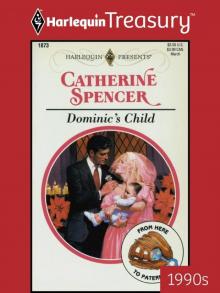 Dominic's Child
Dominic's Child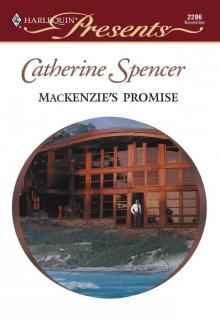 MacKenzie's Promise
MacKenzie's Promise The Moretti Marriage
The Moretti Marriage The Italian s Convenient Wife
The Italian s Convenient Wife Mistress on His Terms
Mistress on His Terms The Millionaire's Marriage
The Millionaire's Marriage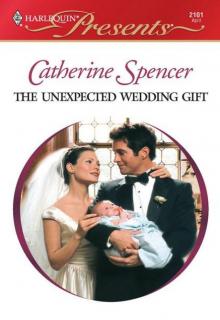 The Unexpected Wedding Gift
The Unexpected Wedding Gift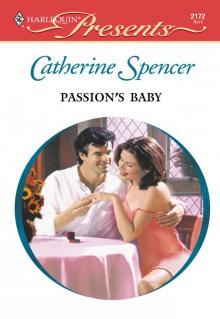 Passion's Baby
Passion's Baby The Italian's Secret Child
The Italian's Secret Child Constantino's Pregnant Bride
Constantino's Pregnant Bride The Pregnant Bride
The Pregnant Bride Christmas With A Stranger_Forbidden
Christmas With A Stranger_Forbidden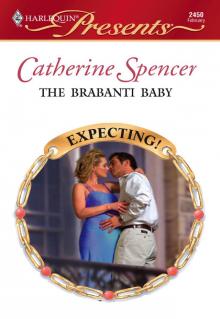 The Brabanti Baby
The Brabanti Baby Convenient Brides
Convenient Brides The Italian Doctor’s Mistress
The Italian Doctor’s Mistress The Secret Daughter
The Secret Daughter The Costanzo Baby Secret
The Costanzo Baby Secret The Doctor's Secret Child
The Doctor's Secret Child A Nanny in the Family
A Nanny in the Family D'Alessandro's Child
D'Alessandro's Child In the Best Man's Bed
In the Best Man's Bed